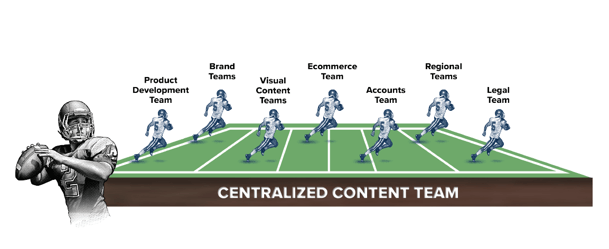How to Build the Perfect Strike Team
Written By: Joe Gaudreau
 Taking the leap to wrangle all the product content that exists throughout your organization into a single, organized place is a complex undertaking. No matter the size of your organization, it requires coordination across multiple stakeholders. Done right, it will boost your sales and decrease your overhead. But to get it right, you’re going to need what we at Salsify call a Strike Team. That’s our term for a cross-functional team responsible creating those critical processes needed for successful product experience management within your organization. This group needs to be ready to sprint, deliver some quick wins, and drive change throughout your organization.
Taking the leap to wrangle all the product content that exists throughout your organization into a single, organized place is a complex undertaking. No matter the size of your organization, it requires coordination across multiple stakeholders. Done right, it will boost your sales and decrease your overhead. But to get it right, you’re going to need what we at Salsify call a Strike Team. That’s our term for a cross-functional team responsible creating those critical processes needed for successful product experience management within your organization. This group needs to be ready to sprint, deliver some quick wins, and drive change throughout your organization.
Captaining an awesome Customer Success team and being part of cross-functional strike teams both at Salsify and during my time doing projects with the NFL, I have seen first-hand that the most successful projects are the results of the hard work of many and a shared vision by all. The foundation for a great Strike Team has four key pillars:
- Great Communication
- A Clear Plan
- Defined Roles
- Passionate Resources
Prioritize Great Communication Twice
Great communication happens when it’s a priority for the organization AND it’s a priority for every individual in the organization. We recommend you use all of the following for your Strike Team:
- Have weekly check-ins across the Strike Team.
- Get buy-in from directors and VPs across other business units.
- Establish goals for the first 30 and 60 days right up front.
- Put together a manage-up strategy so we are telling our executives rather than having them ask us for status.
At Salsify, great communication is a company initiative. Each new strategic project has in person 15 minute standups (casual check-in meetings) with the Strike Team. We also use Slack, an online chat tool, to easily communicate with everyone on the Strike Team. When the project vision is laid out, we manage up to our executive team on how progress is being made towards delivering against the objective. For example, during our Google Shopping project, the Strike Team communicated regular progress with one another, as well as shared key milestones with Salsify’s executive leadership.
Explicitly Define Team Roles

Learn more about team management from "Winning at Distributed Commerce"
The most important pillar of a great Strike Team is each member knowing what they own and what their deliverables are. This is crucial for driving efficiency and accountability. When Salsify customer champions work with our customers on implementing or expanding their product experience management systems, we work with the following Strike Team members:
Executive Sponsor
Role: Defines business success and strategic initiatives.
Responsibilities: Starts with the end in mind and keeps focus on the goal, and reports project status, business achievements, and new opportunities monthly or quarterly to the C-Suite.
Project Lead
Role: Devises the tactical plan and can act as the key linchpin between the individual contributors and the Executive Sponsor, who holds the business relationship.
Responsibilities: Owns the tactical project plan, defining the different roles and responsibilities for the other team members, and communicates on short term and long term goal status.
Existing Systems Expert
Role: Understands the different internal systems that store your content across the organization today. This is usually a key stakeholder from the IS or IT department.
Responsibilities: Defines the tech stack and where this project fits, supplies and provides access to basic product content (ERP, PLM, DAM, CMS, etc.), and defines content automation specs and capabilities.
E-commerce Account Expert
Role: Understands your company’s current retail relationships and requirements
Responsibilities: Defines who within the company will manage each retail channel and sets company’s go-to market commerce strategy.
Brand Team and/or Marketing Peer
Role: Develops marketing content or owns relationship with agency
Responsibilities: Develops digital assets and marketing strategy (including product catalogs)
Develop a Clear Plan
Any major project or deadline can feel insurmountable unless broken up into smaller parts. Having a clear plan and defining your goals is a great way to start. When you first tackle centralizing all product content across your organization, there are a hundred moving parts that need to be organized. Taking an agile approach can help.
Create a shared project plan between all stakeholders that:
- Contains weekly milestones.
- Outlines clear next steps and highlights potential roadblocks (get out in front of it!). This will help you to avoid finger pointing, group dissention, and siloed priorities.
- Has well defined goals throughout. Well-defined goals should include who, what, when, and adequate resources (human capital and financial capital); and allow the project team to figure out the how (and maybe even when). Poorly defined goals tell you what, but nothing more.
Our Google Shopping project had a comprehensive plan. The goal was to build a Google Manufacturer and Merchant Center direct connection to empower our customers to be able to merchandise through Google Shopping, making sure that had ownership of their product content with Salsify.
Passionate Resources
Passionate resources are a result of the successful execution of the first three pillars. Resources cross the change-curve chasm with a giant leap rather than a slow climb down and back up. When resources are aligned towards a goal, have clear roles, and have a defined plan - they become SUPER passionate about the result.
Why just celebrate at the end of a project? You should also celebrate those little milestones along the way. Did you do something amazing as a team? Celebrate it and keep that momentum going. Celebrate these passionate resources and don’t dismiss wins of any size.
At Salsify we use a #Wins Slack Notification that gets shared out to the entire company. Wins that Customer Success achieves with our customers are shared by a #Win, project update sent to the company, next steps (and who they need to help). And happily, the Strike Team also delivered ahead of schedule!
Celebrate your own wins! Check out what our customers have achieved with Salsify.
One of my favorite things about captaining our awesome customer champions is getting to work with our customers to ensure successful implementation, stakeholder onboarding, and end-user adoption of Salsify. The most successful projects have one thing in common: the hard work of many and a shared vision by all. It’s about bringing together a great team to solve the problem at hand, utilizing great communication, clear plans, defined roles and passionate resources. Go gather those key people, get out there and build yourself the perfect Strike Team!
Written by: Joe Gaudreau
I'm a Customer Champion for Salsify. Love helping our customers navigate the complex world of e-commerce. When I'm not playing catch or changing diapers.
Recent Posts
How Brands Can Use Digital Product Passports To Promote Sustainable Commerce and Build Consumer Trust
7 Excellent Product Description Writing Examples
How the Pantone Color of the Year Affects Brand Strategy
Subscribe to the Below the Fold Newsletter
Standing out on the digital shelf starts with access to the latest industry content. Subscribe to Below the Fold, our monthly content newsletter, and join other commerce leaders.

.svg)